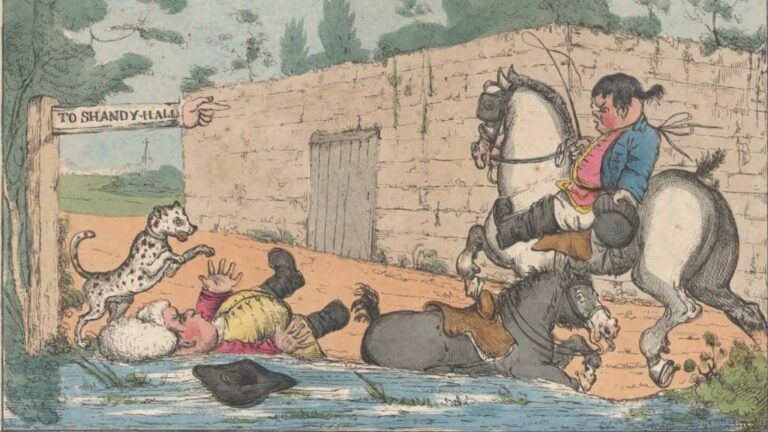A general presentation of Tristram Shandy
The title shows that novelists played with the rules of the New Novel genre. Tristram Shandy is a unique literary experience. It is a long and intricate text that does not even tell a story, or at least in an unusual way. It cannot be read from cover to cover: there is no unique plot but digressions, essays, and experiments with typography.
We can find blank pages, drawings, dashes, italics and chapters which have gone missing. It is much more complicated than a joke, it is a book that is highly interesting in its artistic form. It is a reflexive text, which is also commenting on the meaning of fiction writing.
The influences of other writings
Sterne was a cultivated vicar and a well-read man, influenced by Shakespeare, Rabelais, and Cervantes but also by philosophers such as Descartes or Locke.
Tristram Shandy was published in several instalments. Volumes 1-6 were published in 1760-1761, and volumes 7-9 were published between 1765 and 1767. Tristram Shandy was immediately successful and made Laurence Stern rich. However, Sterne contracted tuberculosis and had to go to France (the description of Paris is in vol. 7). Several authors influenced Laurence Sterne.
Don Quijote
Sterne likes Cervantes’ comic method which consists of telling simple insignificant events by using epic style. There’s a distortion, a gap between the event or action and how the event is described. This gap is what is called “mock-heroic”: it is not serious enough to be epic, and it creates a comic effect.
Gargantua and Pentagruel
Not only does Rabelais show bawdy jokes and “double-entendres”, but “nose” is Tristram Shandy also means something else… without paying attention to social etiquette or good manners.
The tradition of the learned wit comes from the medieval system of knowledge: the use of Latin to show off. We can find traces of this in Le Malade Imaginaire by Molière, in the way of satirizing a system of knowledge which relied heavily on difficult words, using medical and legal vocabulary that no one could understand. In Vol. 8, chapter 34, Mr Walter Shandy recommends a diet to his brother who suffers from a serious illness: he’s in love. That’s a satire of doctors.
The comical effect comes from using a lot of learnt words that are not used in everyday life, and showing off one’s culture. There is a discrepancy between the learnt references and the disease which is simply that Tobby is in love.
John Locke
Tristram Shandy was also influenced by philosophers, especially “Essay Concerning Human Understanding” by John Locke, who was interested in how the human mind works. He wondered why the min was filled with such different elements: memories, pictures, obsessions… Locked started by claiming that there aren’t any innate ideas in the mind, since the mind is blank at birth. Therefore, everything in the mind is necessarily derived from experience. That is the notion of empiricism: knowledge is derived from experience.
Sterne was interested in Locked because he had studied language and communication. He asserted that words were imperfect and could not translate the real essence of things.
A word is always a sign supposed to evoke a mental representation of an object in its absence. Sometimes, a word can signify different things to different people: the communication may lead to confusion and misunderstanding.
For instance, “bridge” in Tristram Shandy: it’s a fortification for Uncle Tobby, but it is a facial splint for Doctor Slop, the obstetrician. Hence language is imperfect and its use may lead to a lot of confusion.
Language is also made of associations of ideas. In your mind, you move from an idea to another idea with any link or explanation. In TS, there are digressions, with cock and bull stories, and shaggy dog stories.
A quick survey of the contents of Tristram Shandy
In the novel, there is a fictitious character who pretends to write an autobiography. He starts by telling the story of his life before he was born: “scurvy and disastrous world” is the way he sees the world he came in. He insists on his birth: his nose was crushed and Doctor Slop (sloppy: bad work) did not do anything to help.
Tristram is not the name chosen by his father. It should have been “Trismegistus”, which means “thrice greatest”. The nurse did not know how to pronounce it and said: “Tristram is born”.
His childhood is full of incidents: he was circumcised by a sash window. It is impossible to give a detailed account of the story, for several plots are mixed and overlap: Uncle Tobby (Captain Tobias Shandy) is Walter Shandy and Tristram’s father.
The Triestapedia is a set of rules on how children should be raised. It is based on Fenelon’s Telemachus. This book is a “model”, that is to say, a book full of confusion (cf. E. M. Forster).
The technique of characterization: each character is associated with a particular idea. Uncle Tobby constantly plays war in his garden: he does in a game what the novelist does in his book – imitation and reproduction. Making war is a hobby horse.
Conclusion
All the characters, described as eccentric, have stayed popular in English fiction. According to Hazzlit, Uncle Tobby is “one of the finest compliments ever paid to human nature”.

